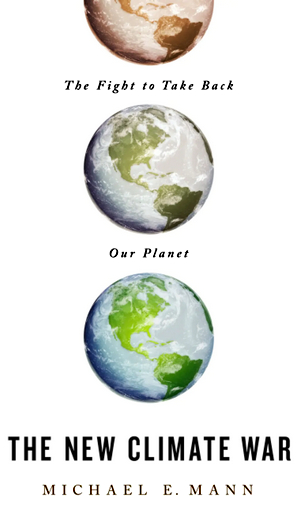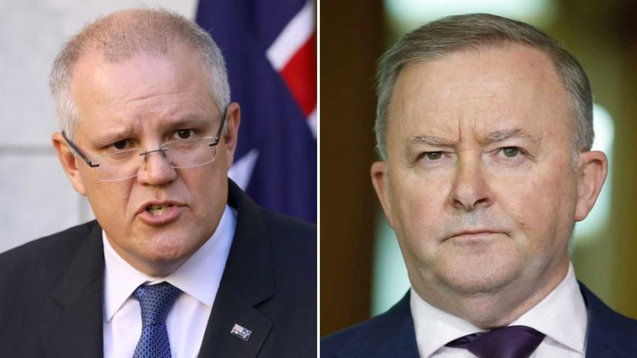Michael Mann said he's seen tactics shift from science denial to attempting to paralyze climate action

|
|
Michael Mann, professor of atmospheric science at the Pennsylvania
State University, and author of 'The New Climate War'
(Sydney Herdle) |
Michael Mann Michael E. Mann is distinguished professor of atmospheric science at
Pennsylvania State University. He is author of the upcoming book The New Climate War: The Fight to Take Back Our Planet. |
He was also one of the targets of a massive email hack dubbed "Climategate" aimed at discrediting climate scientists.
As a result of all this he gained an intimate knowledge of the strategies of those who are attempting to resist climate action — climate change deniers, and those trying to derail the political and social changes necessary to fight climate change.
Recently he's started seeing those strategies shift. In his new book, The New Climate War, he lays out what he's seeing, and what he thinks we need to do to preserve our planet. He spoke with Bob McDonald about his new book.
Dr. Mann is a climate scientist and distinguished professor of atmospheric science at Pennsylvania State University.
This interview has been edited for length and clarity
Q: You titled your book The New Climate War. How is it different from the old one?
A: The old climate war really was this basic attack on the foundational scientific evidence, an effort to discredit the very science underpinning human influence on our climate, and that is simply no longer credible.
The forces of inaction haven't given up, but they've turned to a whole new array of tactics in their effort to prevent us from moving on, seeking to divide the climate advocacy community, getting us arguing and fighting with each other, deflecting attention away from the needed systemic changes, the needed policies towards individual behaviour, as if it's just a matter of individuals behaving better.

|
|
The iconic hockey stick graph published by Dr. Mann and his
colleagues in the journal Nature in 1998. (Nature) |
Q: You have a four-point battle plan. Take me through that.
A: First of all, don't waste all your time and effort debating climate change deniers. They're a fringe element. There are innocent bystanders, people who are caught sort of in the middle who are essentially victims of their efforts to deny the reality of climate change. And so we need to help those people out by providing them resources, by educating them about what the science has to say. I call them the persuadable middle.
The youth climate movement has been a game changer. Greta Thunberg and her fellow youth climate protesters, they've really centred this issue where it should have been all along. It's not just about the science or the economics or the politics and the policy issues. It's about ethics, our obligation not to degrade or destroy this planet for future generations.
We need a price on carbon, and Canada has that. The United States doesn't. We still lag behind. We need incentives, massive incentives, for renewable energy. We need all of these governmental policies that individuals like you and I can't pass on our own.
And, by the way, if they can make it about individual behaviour and lifestyle, well, all the better for them because then they can get us fighting with each other, finger-pointing and carbon-shaming each other because of our lifestyle choices when it comes to our food or our modes of transportation or whether we choose to have children. They would love nothing more than to have us fighting with each other about our individual lifestyle choices rather than representing a united front demanding action.
Q: You call out misinformation as being one of the biggest battles we're fighting these days, and you were famously the victim of a massive disinformation campaign. How have misinformation and misdirection shaped the fight against climate change?
A: You alluded earlier to the so-called "Climategate" affair, which was this massive disinformation campaign based on stolen emails of scientists. WikiLeaks played a role in promoting this. The fossil fuel industry played a role. State actors like Russia and Saudi Arabia played a role.

|
|
Mann is inspired by the youth climate movement, and young leaders
like Greta Thunberg, pictured here at a climate strike in Vancouver.
(Maggie MacPherson/CBC) |
There are powerful vested interests who have seen it as advantageous to their agenda, to discredit science and to discredit the message of science.
Q: Take me through some of the false narratives that you're trying to debunk about climate change.
A: So this is one important narrative: doom and gloom, despair mongering. There are climate advocates who, you know, of good intentions, of goodwill, who have come to believe that it's too late to do anything about the problem.
That's very dangerous because first of all, it's not true. The science indicates otherwise. The science indicates that if we reduce our carbon emissions dramatically, we can avert the worst impacts of climate change. For example, this idea that global warming is now unstoppable, that warming is going to release so much methane from the Arctic that it will warm the planet beyond habitable levels. There is no scientific support for that contention.
A lot of the folks who fall victim to the doom and gloom are, again, of good intentions, of good will. But they're being weaponized. The inactivists love that narrative because they don't care about the path you take to inaction, whether it's outright denial of the science or denial that there's any possibility of doing anything about the problem.
Q: Now, you are a scientist first. What science are you working on these days when you're not writing books?
A: I do continue to do science. When it comes down to it, what I really enjoy doing most is doing science that is cranking out calculations, analyzing data sets, running models and comparing them with observations.
So some of the problems we're working on right now include understanding the relationship between climate change and the sorts of extreme weather events we've seen in recent summers in Canada and the United States and Europe and around the world: unprecedented heat waves and wildfires and floods and droughts. And it turns out that in researching the connections, we learned a couple of things.

|
|
The New Climate War by Michael Mann
|
One of them is that even the state of the art climate models right now aren't capturing some of those connections. And so the climate models may be underestimating the impact climate change is having in producing these unprecedented, dangerous, extreme weather events.
To understand these connections, you end up using math, math and physics tools that were developed back in the early nineteen hundreds for problems in quantum mechanics. So it turns out to understand the impact that climate change is having on these extreme weather events at the planetary scale, we ended up turning to some of the math and physics that I studied decades ago to understand the behaviour of matter at the smallest scale.
Q: You've been fighting this climate war for decades. Progress has been remarkably slow. Here we are in the 21st century. We're still on fossil fuels. Emissions are still rising. And yet you say that you're cautiously optimistic. Why is that?
A: Yeah, I'm optimistic. Even the critics can no longer deny that climate change is real. It's happening because people can see it with their own two eyes.
Science denial is deadly and coronavirus has taught us that. We will get past this crisis. A year from now I think it will be largely in our rearview mirror. But still looming there will be, of course, the even greater crisis of climate change. And I'd like to think that the coronavirus crisis, the pandemic, has opened up an important conversation that will help us as we address this even larger crisis.
Links





